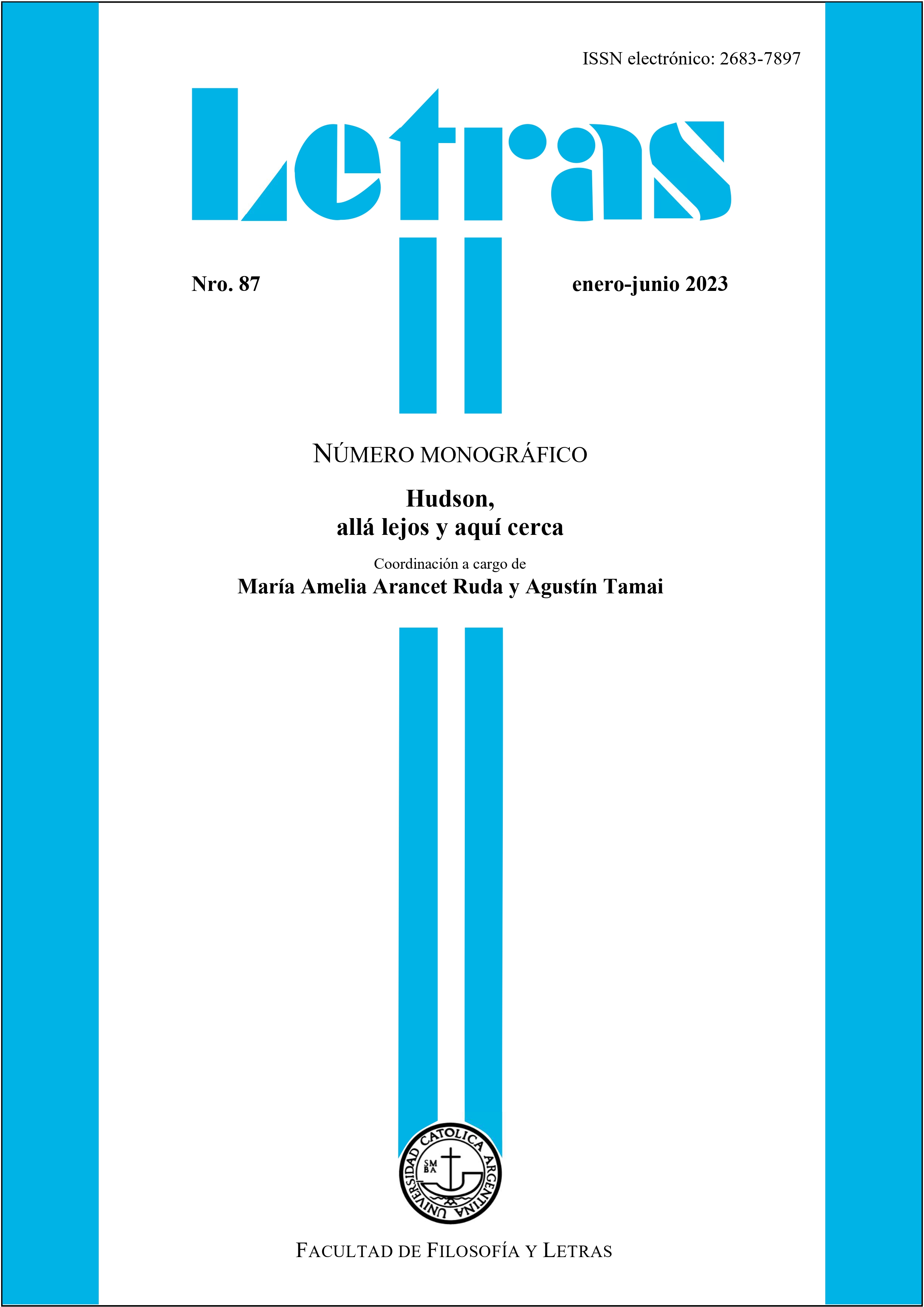Las huellas del yanqui en la vida y obra de Hudson
DOI:
https://doi.org/10.46553/LET.87.2023.p36-54Palabras clave:
Identidad yanqui, acento, cultura puritana, Biblia, Thoreau, indios, natrualista de campo, RimaResumen
Este ensayo está dividido en tres partes. La primera parte busca la evidencia de su pasado yanqui y puritano a través de detalles, ya que Hudson apenas tocó el tema. Trato de indagar en la influencia de la Biblia leída a diario en inglés como su formación; el odio de su madre a los ingleses e Inglaterra, como enemigo después de la guerra de Independencia; finalmente, cómo hablaba Hudson y cómo escribió su ficción en contra de las demandas puritanas de su madre. La segunda parte trata de la enorme admiración que Hudson tenía por Thoreau, como ejemplo de su identidad norteamericana o yanqui, y sus inclinaciones hacia los indios norteamericanos y el naturalismo. La tercera parte explora la tardía fama norteamericana, la Rima de Epstein y la película sobre Mansiones verdes y el destino de Rima que siguió a Hollywood y no a la novela de Hudson.
Descargas
Citas
Ackroyd, Peter, 1984, T. S. Eliot, London: Hamish Hamilton.
Allan, David Elliston, 1976, The Naturalist in Britain, London: Allen Lane.
Belloc, Hilaire, 1902, The Path to Rome, London: Nelson and Sons.
Bunyan, John, 2008, The Pilgrim's Progress. From this World to that Which is to Come. Ed. Roger Pooley, London: Penguin Books.
Davidson, Michael, 1993, "American Poetry" en The New Princeton Encyclopedia of Poetryand Poetics, edited by Alex Preminger and T. V. F. Brogan, Princeton: Princeton University Press, 50.
Eliot, T. S. 1941, "Rudyard Kipling", A Choice of Kipling's Verse, London: Faber and Faber.
Emerson, Ralph Waldo, 1946, "Thoreau", The Portable Emerson, ed. Mark Van Doren, New York: The Viking Press.
Espinosa, Enrique, 1941, "La reconquista de Hudson", Babel 18, Año XXI, julio-agosto, 67-88.
Franklin, Benjamin, 1916, Autobiography, New York: Henry Holt.
Garnett, Edward, 1922, "William Henry Hudson", Friday Nights. Literary Criticisms and Appreciations, London: Cape.
Haymaker, Richard E., 1954, From Pampas to Hedgerows and Downs: a Study of W. H. Hudson, New York: Bookman Associates.
Hudson, William Henry, 1908, Land's End, London: Hutchinson.
Hudson, William Henry, 1919, The Book of a Naturalist, London: Hodder and Stoughton.
Hudson, William Henry, 1922, Green Mansions, London: Duckworth.
Lee, A. Robert, 2007, "Thoreau", Justin Wintle (ed.), New Makers of Modern Culture, Routledge: London, 1491-1495.
Martin, Gerald, 1995, “Regionalism: Narrative between the wars”, Leslie Bethell (ed.) The History of Latin America, vol X, Cambridge: Cambridge University Press.
Nussbaum, Martha C., 2022, "A Peopled Wilderness", The New York Review of Books, December 8, 21-23.
Onfray, Michel, 2017, Thoreau, el salvaje. Traducción de Edgardo Scott, Buenos Aires: Ediciones Godot.
Roberts, Morley, [1925] 1928, Men, Books and Birds, London: Cape.
Sims, Michael, 2014, The Adventures of Henry David Thoreau, London: Bloomsbury.
Stevenson, Robert Louis, 1892, "Henry David Thoreau: his Character and Opinions" en Familiar Studies of Men & Books, London: Nelson.
Theroux, Paul and Chatwin, Bruce, 1985, Patagonia Revisited, Salisbury: Michael Russel.
Thoreau, Henry David, 2012, The Portable Thoreau, edited, with an introduction, by Jeffrey S. Cramer, New York: Penguin.
Thoreau, Henry David, 1967, The Selected Journals, edited with a foreword by Carl Bode, New York: Signet Books.
Walker, John, 1986, “W. H. Hudson and the New England Tradition”', Hispania, March, 34-39.
Descargas
Publicado
Cómo citar
Número
Sección
Licencia
Derechos de autor 2023 Jason Wilson

Esta obra está bajo una licencia internacional Creative Commons Atribución-NoComercial-CompartirIgual 4.0.












